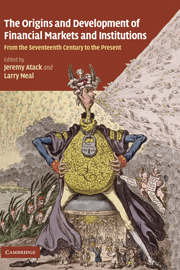 The Origins and Development of Financial Markets and Institutions
The Origins and Development of Financial Markets and Institutions Published online by Cambridge University Press: 04 August 2010
Since the mid-1990s, many countries have experienced prolonged periods of rapid price appreciation in equity, housing, and other asset markets which have drawn the attention of economists and policymakers to the role of asset prices in the propagation of business cycles. Economists disagree about the appropriate response of monetary policy to such asset price booms. Some argue that financial markets are inherently volatile and that market prices often stray from fundamentals, suggesting that policymakers could improve welfare by deflating asset price booms, especially if sudden asset price declines are likely to depress economic activity. Other economists claim that financial markets process information efficiently or that policymakers usually cannot determine when assets are mispriced and, hence, that they cannot enhance aggregate welfare by reacting to asset price movements.
Such episodes have also fascinated financial historians, and research into these phenomena has yielded important information about the development of financial markets and the effects of financial regulation and macroeconomic policy on the stability of markets. We believe that history can also inform the debate about the appropriate response, if any, of monetary policy to asset price booms. Accordingly, this chapter investigates the macroeconomic and policy environments in which stock market booms occurred among ten developed countries during the twentieth century. Our multi-country historical approach enables us to explore the association between stock market booms and key macroeconomic and monetary policy variables across a variety of policy regimes and regulatory environments.
To save this book to your Kindle, first ensure [email protected] is added to your Approved Personal Document E-mail List under your Personal Document Settings on the Manage Your Content and Devices page of your Amazon account. Then enter the ‘name’ part of your Kindle email address below. Find out more about saving to your Kindle.
Note you can select to save to either the @free.kindle.com or @kindle.com variations. ‘@free.kindle.com’ emails are free but can only be saved to your device when it is connected to wi-fi. ‘@kindle.com’ emails can be delivered even when you are not connected to wi-fi, but note that service fees apply.
Find out more about the Kindle Personal Document Service.
To save content items to your account, please confirm that you agree to abide by our usage policies. If this is the first time you use this feature, you will be asked to authorise Cambridge Core to connect with your account. Find out more about saving content to Dropbox.
To save content items to your account, please confirm that you agree to abide by our usage policies. If this is the first time you use this feature, you will be asked to authorise Cambridge Core to connect with your account. Find out more about saving content to Google Drive.